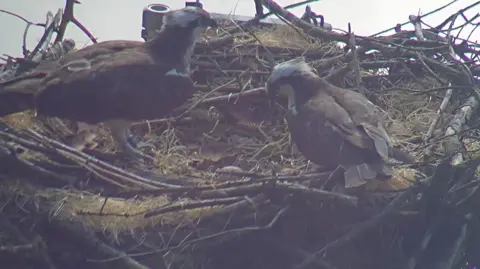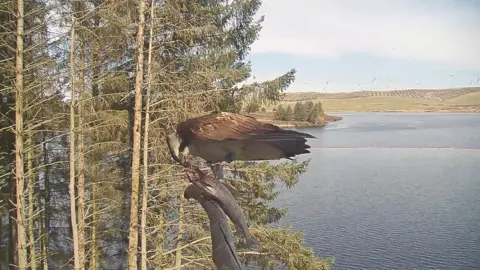Bid to lure ospreys to new nest after chainsaw attack
Conservationists hope a pair of ospreys will nest at a new site after their platform was cut down with a chainsaw.
A decoy egg has also been placed on the nest as the female had laid an egg a day before the attack at Llyn Brenig, which borders Conwy and Denbighshire.
BBC Springwatch presenter Iolo Williams said it was "environmental vandalism of the worst kind".
CCTV cameras recorded the moment the platform was cut down and North Wales Police branded it a "disgusting act".
In a tweet, Rob Taylor, rural crime team manager for North Wales Police, said the force was "pulling the stops out to try and catch the person or persons responsible for this".
"The whole team are absolutely devastated by it and I'm sure the whole community are as well," he added.
"Believe me, they will receive the full force of the law."
 NWP Rural Crime Team/Twitter
NWP Rural Crime Team/TwitterThere are five pairs of ospreys in Wales and the birds and their eggs are protected under the Wildlife & Countryside Act which makes it an offence to interfere with them or their nest.
According to the RSPB, the female osprey lays two or three eggs between one and three daily intervals in the second half of April, and incubates them for 37 days per egg.
Allow X content?

BBC Springwatch presenter Iolo Williams told Sunday's BBC Breakfast he hoped the birds would attempt to nest again as it was early in the season.
"What we're hoping is that by putting a dummy egg in a nearby nest, then the female will be induced to head over there and lay two, maybe even three eggs again," he said.
"If she leaves two eggs there and incubates those successfully, we'll be delighted, although that doesn't take away from this idiotic act of vandalism."
 Welsh Water
Welsh WaterBrenig Osprey Project, a partnership with Welsh Water and North Wales Wildlife Trust, thanked the public for support following the attack on Friday night.
In a Facebook post, it said its "priority has been to protect the birds" and, on Saturday, it had cleared another platform the ospreys had been "scouting out" and had added the decoy egg.
"Our hope is that they will relocate to it within days," it said.
"The female may well even be ready to lay, and we think we've given her a good option."
